Budget 2022

Budget 2022 includes measures which continue to support the economy after the fallout from COVID-19 while new measures are being introduced to address climate change.
EisnerAmper Ireland summarises key measures included in Budget 2022 across the following four areas:
- Employment & Personal Tax Measures;
- Corporate & Enterprise Measures;
- Indirect Taxes Measures; and
- Other Measures.
1. Employment & Personal Tax Measures
Income Tax, USC and PRSI
- The standard rate band for Income Tax is being increased by €1,500 in 2022 from €35,300 to €36,800 for a single person and from €44,300 to €45,800 for married couples / civil partners with one earner.
- The Personal Tax Credit, Employee Tax Credit and Earned Income Tax Credit have all been increased by €50 from €1,650 to €1,700.
- The Sea-going Naval Personnel Tax Credit which was introduced in 2020 has been extended until 31 December 2022.
- The reduced rate of USC for medical card holders and people aged 70 and above whose income is €60,000 or less has been extended for another year until 31 December 2022.
- Due to an increase in the National Minimum Wage from €10.20 to €10.50 per hour on 1 January 2022, the threshold for the 2% rate of USC has increased from €20,687 to €21,295. This is to prevent full-time workers on minimum wage from paying USC at the top rates.
- The weekly threshold for the higher rate of Employer’s PRSI has been increased from €398 to €410.
- The BIK exemption for battery electric vehicles will be extended to 2025 with a tapering effect on the vehicle value. This measure will take effect from 2023. For BIK purposes, the original market value of an electric vehicle will be reduced to €35,000 for 2023; €20,000 for 2024; and €10,000 for 2025.
Working from Home Deduction
- Taxpayers who work remotely will be allowed to claim an Income Tax deduction of 30% of the cost of heat, electricity and broadband incurred on days spent working from home.
Electricity Micro-generation
- Households who sell residual electricity that they generate back to the grid will be allowed a €200 tax disregard on their personal income.
Employment Wage Subsidy Scheme (“EWSS”)
- The EWSS will be extended until 30 April 2022 in a graduated form.
- There will be no change to EWSS for the months of October and November 2021.
- Businesses availing of the EWSS on the 31st of December 2021 can continue to be supported until the 30th of April 2022:
- from December 2021 to February 2022, the original two-rate structure of €151.50 and €203 will apply;
- for March and April 2022, a flat rate subsidy of €100 will be put in place.
- The reduced rate of Employers’ PRSI will not apply for March – April 2022.
- The scheme will close to new employers from 1 January 2022.
Taxation of International Flight Crew
- An amendment will be introduced in the Finance Bill to exclude non-resident flight crew from Irish Income Tax where certain conditions are satisfied. The details will be provided in Finance Bill 2021.
Pre-letting Rental Expenses
- The Finance Act 2017 introduced a provision which allowed a tax deduction against rental income for pre-letting expenses (expenditure that was incurred during the 12 months prior to being let after a vacant period). This provision was due to expire on 31 December 2021. Budget 2022 now extends the tax deductibility for pre-letting rental expenses to 31 December 2024.
2. Corporate & Enterprise Measures
New Corporation Tax credit for the digital gaming sector.
- Relief will be available as a refundable Corporation Tax credit at a rate of 32% on eligible expenditure (relating to the design and production of digital games) of up to a maximum limit of €25 million per project with a per project minimum spend requirement of €100,000.
Corporation Tax relief for certain start-up companies
- The relief will be amended to allow companies claim relief within their first five years of trading, an increase from the current three-year claim window.
Employment Investment Incentive (“EII”)
- The EII scheme is being extended to the end of 2024. Other provisions are being introduced with the aim to make the EII scheme more accessible – to open up the scheme to a wider range of funds and to make it easier for investors to redeem their capital without being subject to a penalty.
Headline Corporation Tax rate
- The Minister reiterated that agreement has been reached that the Irish headline Corporation Tax rate will increase to 15% (from 12.5%). However, the increased Corporation Tax rate will apply only to businesses with annual revenues exceeding €750m.

3. Indirect Taxes Measures
VAT
- The Minister has confirmed the reduced VAT rate of 9% for the hospitality sector will expire at end of August 2022 as previously suggested.
- The Minister also announced a change to the Farmers Flat Rate Scheme. There will be a decrease in the farmers’ flat rate addition from the current 5.6% to 5.5% in respect of 2022. The flat-rate scheme compensates un-registered farmers on an overall basis for VAT incurred on their farming inputs.
Vehicle Registration Tax (VRT)
- Budget 2022 introduced increases in the rates of VRT. From January 2022, the Minister said that a revised VRT table is being introduced. The 20 band table will remain with an increase in rates with a 1% increase for vehicles that fall between bands 9-12, a 2% increase for bands 13-15 and a 4% increase for bands 16-20.
Carbon Tax
- The Minister has confirmed that the Carbon Tax will increase by €7.50 from €33.50 to €41 per tonne of carbon dioxide emitted as flagged in the Finance Act 2020. The Finance Act 2020 provided for annual increments in the Carbon Tax of that amount every year out to 2030. This increase will be effective as of Budget night for auto fuels and 1 May 2022 for all other fuels.
Transfers of land to young trained farmers
- An extension to the Young Trained Farmer Stamp Duty relief was announced by the Minister. This measure means that full relief from Stamp Duty on the conveyance of farmland remains available to eligible young trained farmers to the end of 2022. In the context of this relief, the young trained farmer must be below the age of 35. This relief represents a 7.5% Stamp Duty saving.
4. Other Measures
Warehousing of Tax Liabilities
- Previously, company owners who had a material interest in their company were restricted from availing of the warehousing of debt provisions for employment income from that company. The provisions relating to warehousing of debt were introduced on account of COVID-19 and were effectively a deferral of certain tax liabilities.
- Budget 2022 now allows for such self-assessed income tax-payers who have that material interest in the company to warehouse Income Tax liabilities relating to the employment income from that company.
Help to Buy Scheme
- This scheme was due to cease on 31 December 2021. Budget 2022 now extends that relief to 31 December 2022 and provides that the enhanced relief will be available.
Accelerated Capital Allowances
- The Accelerated Capital Allowance scheme for Energy Efficient Equipment is being amended to exclude equipment directly operated by fossil fuels from qualifying for the scheme.
- The Accelerated Capital Allowance scheme for Gas Vehicles and Refuelling Equipment allows an accelerated deduction when businesses invest in vehicles powered by natural gas /biogas and related refuelling equipment. The scheme is being extended to the end of 2024 and is being amended to include hydrogen powered vehicles and refuelling equipment.
Anti-Tax Avoidance Measures
- Budget 2022 introduced a new rule in relation to interest limitation. This will limit deductible interest expenses to 30% of EBITDA for companies falling within the scope of the measure. Disallowed interest may be carried forward and may be deducted in future years if the company has sufficient interest capacity.
- Also introduced are new anti-reverse-hybrid rules. These rules may bring certain tax transparent entities (such as partnerships) within the scope of Irish tax where the entity is 50% or more owned/controlled by entities resident in a jurisdiction where a non-aligned tax treatment would cause a double non-taxation to occur.
How EisnerAmper Ireland Can Help
At EisnerAmper Ireland, we design and deliver business & compliance solutions to make trade happen. This is what we do every day.
EisnerAmper Ireland’s Tax Department advises corporates, their people and principals operating in the technology, life sciences, real estate, structured finance, aircraft leasing and investment funds industries. To find out more, visit our Tax Services page.
Contact Us
Request a Callback from our Tax specialists now.
Authors
The content above is provided for general information purposes only and is not intended to provide, nor does it constitute, professional advice on any particular matter. If you would like more information or would like to discuss any of the topics raised above, please contact the author(s).
Budget 2021

With Budget 2021 announced earlier this week, EisnerAmper Ireland examines its effect on Irish-based businesses across the following four areas:
- Corporation Tax;
- Indirect Tax;
- Employment and Personal Tax; and
- Other Taxes.
1. Corporation Tax
– Corporation tax rate on trading profits
There has been no change to the 12.5% corporation tax rate applicable to the trading profits of a company.
The government has announced the extension to the accelerated capital allowances for energy savings plant and machinery to the end of 2023.
2. Indirect Tax
– VAT
The rate of VAT for the hospitality and tourism sector, currently 13.5%, will be reduced to 9% from 1 November 2020 until 31 December 2021.
The standard rate will revert from the current 21% to 23% from 1 March 2021 as outlined in the July Stimulus Plan.
The Flat rate of VAT for Farmers will increase from 5.4% to 5.6%.
– Other Indirect Tax considerations
The rate of carbon tax on fuel has increased from €26 to €33.50 per tonne of CO2. This has been applied to diesel and petrol as of midnight on 13 October 2020 which is approximately 2.5 cent a litre, with the increase to home heating oil being deferred until May 2021. This will increase by €7.50 per year until 2029 with a €6.50 increase in 2030 to bring the tax to €100 per tonne of CO2.
VRT reliefs for conventional and plug-in hybrid vehicles will finish at the end of 2020.

3. Employment and Personal Tax
– Income Tax, USC and PRSI
The Dependent Relative tax credit has increased by €175 to €245 and the Earned Income tax credit for Self Employed individuals has increased by €150 to €1,650 for 2021. The Sea-going Naval personnel Tax Credit has been extended until 31 December 2021 and increased from €1,270 to €1,500.
The reduced rate of USC for medical card holders and people aged 70 and above whose income is €60,000 or less has been extended for another year, until 31 December 2021.
Due to an increase in the National Minimum Wage from €10.10 to €10.20 per hour on 01 January 2021, the threshold for the 2% rate of USC has increased from €20,484 to €20,687. This is to prevent full-time workers on minimum wage from paying USC at the top rates.
The weekly threshold for the higher rate of Employer’s PRSI has been increased from €394 to €398. The higher rate, which was expected to increase, remains at 11.05% for 2021.
Employee’s PRSI is unchanged.
– Benefit in Kind (BIK)
There was no change to the 0% BIK rate for employers providing electric cars or vans, which is due to remain in place until 31 December 2022.
– Tax Debt Warehousing
The tax debt warehousing scheme has been expanded to include Temporary Wage Subsidy Scheme repayments for employers. For self-employed taxpayers it has been extended to include the 2019 and 2020 preliminary tax liabilities.
4. Other Taxes
– Capital Acquisitions Tax (CAT)
No change was made to CAT rates in the Budget.
– Stamp Duty (SD)
The consanguinity relief, which reduces the rate of stamp duty on land transfer to children, has been extended by 3 years.
The farm consolidation relief, which allows farmers to pay 1% stamp duty when buying and selling land within 24 months in a bid to consolidate land parcels, has been extended by 2 years.
How EisnerAmper Ireland Can Help
At EisnerAmper Ireland, we design and deliver business & compliance solutions to make trade happen. This is what we do every day.
EisnerAmper Ireland’s Tax Department provides support to the Firm’s Financial Services and International Business market groups. We advise corporates, their people and principals operating in the technology, life sciences, real estate, structured finance, aircraft leasing and investment funds industries. To find out more, visit our Tax Services page.
Tax Services
Contact Us
The content above is provided for general information purposes only and is not intended to provide, nor does it constitute, professional advice on any particular matter.
Budget 2020

With Budget 2020 announced earlier this week, EisnerAmper Ireland examines its effect on Irish-based businesses across the following four areas:
- Corporation Tax;
- Indirect Tax;
- Employment and Personal Tax; and
- Other Taxes.
1. Corporation Tax
– Corporation tax rate on trading profits
There has been no change to the 12.5% corporation tax rate applicable to the trading profits of a company.
– Research and Development (R&D) Credit
The R&D credit is being revised for small and micro companies to increase the R&D credit from 25% to 30% and to improve the current method of calculating the limit(s) on the payable credit. New legislation is also being introduced to allow small companies carrying out pre-trading R&D to avail of the credit before trading starts – however the R&D offset in these circumstances is confined to VAT and payroll tax liabilities only. The new rules for small and micro companies are both subject to State aid approval.
With regard to all R&D claimants, the existing limit on outsourcing to third level institutes of education will be increased from 5% to 15%.
– Anti-hybrid measures
Finance Bill 2019 will introduce new anti-hybrid rules which will apply to all corporate tax payers from 1 January 2020. The introduction of these new anti-hybrid rules forms part of Ireland’s promise to implement the Anti-Tax Avoidance Directive (ATAD) and the new rules will be ATAD compliant. The rationale behind the introduction of the anti-hybrid rules is to preclude arrangements that abuse variances in the tax treatment applied under the laws of multiple jurisdictions to generate a tax benefit.
– Transfer Pricing (TP)
The Minister confirmed that updated TP legislation will be included in Finance Bill 2019. These updates will include the formal adoption of the OECD’s 2017 TP Guidelines into Irish domestic legislation and also the extension of transfer pricing rules to cover material capital transactions and cross-border non trading transactions. Subject to Ministerial Commencement Order, the new measures to be introduced will also expand the application of transfer pricing rules to SME’s.
2. Indirect Tax
– VAT
The only change to VAT was the reduction in the qualifying CO2 threshold for reclaims on commercial vehicles.
– Other Indirect Tax considerations
The rate of carbon tax on fuel has increased from €20 to €26 per tonne of CO2. This has been applied to diesel and petrol as of midnight on 8 October 2019, with the increase to home heating oil being deferred until May 2020.
A Nitrous Oxide tax will replace the 1% VRT surcharge on new diesel engine passenger vehicles registered from 1 January 2020.
VRT reliefs for conventional and plug-in hybrid vehicles has been extended until the end of 2020.

3. Employment and Personal Tax
– Income Tax, USC and PRSI
The Home Carer tax credit has increased by €100 to €1,600 and the Earned Income tax credit has increased by €150 to €1,500 for 2020. There was no other change to rate bands and credits.
The reduced rate of USC for medical card holders and people aged 70 and above whose income is €60,000 or less has been extended until 31 December 2020.
The rate of Employer’s PRSI will increase from 10.95% to 11.05% in 2020. Employee’s PRSI is unchanged.
– Benefit in Kind (BIK)
The 0% BIK rate for employers providing electric cars or vans has been extended to 31 December 2022.
– Special Assignee Relief Programme (SARP)
The SARP scheme has been extended until 31 December 2022.
– Key Employee Engagement Programme (KEEP)
Further amendments were announced to the KEEP scheme which was introduced in 2018. Under the new measures the scheme will also apply to:
- Group corporate structures;
- Part time employees; and
- Existing shares.
4. Other Taxes
– Capital Acquisitions Tax (CAT)
The tax-free Group A threshold for gifts or inheritances from a parent to child has increased by €15,000 to €335,000.
– Stamp Duty (SD)
The rate of SD with regard to non-residential property has increased by 1.5% to 7.5% with effect from 9 October 2019. However, the old 6% rate will apply to instruments executed on or before 31 December 2019, where a binding contract was entered into prior to 9 October 2019 and is accompanied by a statement certifying this.
– Dividend Withholding Tax (DWT)
The rate of DWT will increase by 5% to 25% with effect from 1 January 2020.
How EisnerAmper Ireland Can Help
At EisnerAmper Ireland, we design and deliver business & compliance solutions to make trade happen. This is what we do every day.
EisnerAmper Ireland’s Tax Department provides support to the Firm’s Financial Services and International Business market groups. We advise corporates, their people and principals operating in the technology, life sciences, real estate, structured finance, aircraft leasing and investment funds industries. To find out more, visit our Tax Services page
Tax Services
Request a Callback from our Tax specialists now.
Authors
The content above is provided for general information purposes only and is not intended to provide, nor does it constitute, professional advice on any particular matter. If you would like more information or would like to discuss any of the topics raised above, please contact the author(s).
Tips and Gratuities – Payroll Considerations and Legislation Changes
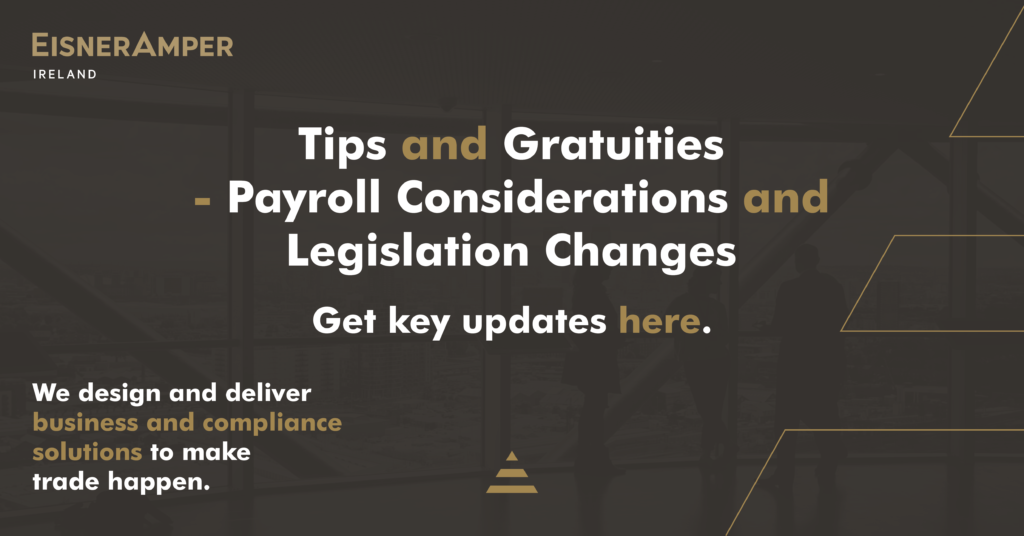
What Are Tips And Gratuities?
Tips and gratuities have been defined as ‘money exchanged from customer to service provider which is not legally required by the agreement for purchase of the service’ (Casey, 1998, as cited in LPC NO. 10, 2018). Generally speaking, they are relatively low value payments given by customers to workers in the service and hospitality industries in excess of the fee due for the transaction which has taken place. The frequency and value of such payments is entirely up to the customer.
Current Practices In Relation To Tips And Gratuities
Tips and gratuities are not specifically covered under the Payment of Wages Act 1991, however the Revenue Tax & Duty Manual Part 42-04-35A states that tips ‘paid to the employer and subsequently paid out to an employee should be included in pay for the income tax week or month in which they are paid out.’ This means that tips and gratuities paid to the employer and subsequently paid to the employee should be considered as pay for PAYE purposes and taxed accordingly, although the National Minimum Wage Act 2000 prevents employers from including these payments in the calculation of the National Minimum Wage. A service charge included as part of the bill should also be taxed as pay if it is paid out to an employee, but unlike tips, these payments can be included in the calculation of minimum wage.
From a wider taxation point of view, it’s worth pointing out that a service charge which is shown on the bill is subject to VAT at the reduced rate of 13.5%, however, tips and gratuities offered voluntarily by the customer are outside of the scope of VAT.
Tips And Gratuities – Current Issues
Currently there is no legislation which obliges employers to pass on any tips received by them to their staff, therefore a customer has no way of knowing if the tip they left was actually given to the intended recipient(s) and the worker has no protection if their employer chooses to keep some or all of the tips left by customers.

Proposed New Measures In Relation To Tips And Gratuities
Proposed new measures announced by the Minister for Employment Affairs and Social Protection, Regina Doherty TD, aimed at ensuring employees receive the tips due to them and providing protections for low paid workers, are expected to include the following:
- The Payment of Wages Act 1991 will be amended to ensure that tips and gratuities cannot be used to make up contractual rates of pay; and
- Employers will be obliged to clearly display their policy on how tips, gratuities and service charges are distributed.
Source: welfare.ie.
When Will The New Tips And Gratuities Measures Be Implemented?
It is currently unclear as to how soon the proposed measures will be introduced, however there was an announcement on 8 July 2019 which stated that the Government has given approval on a draft Heads of a Bill to amend the Payment of Wages Act 1991, which allows the Minister’s Department to draft the required legislation.
How EisnerAmper Ireland Can Help
At EisnerAmper Ireland, our dedicated team of Tax professionals possess the knowledge and experience required to provide guidance and the intelligent solutions you need when either setting up, or running a business, in Ireland. We tailor our offering to your needs, ensuring you receive the best advice at the appropriate time.
Request a payroll quote or request a callback from our specialists now.
Request a Quote
Contact Us
The content above is provided for general information purposes only and is not intended to provide, nor does it constitute, professional advice on any particular matter.
Benefit in Kind (BIK) – Employer Overview
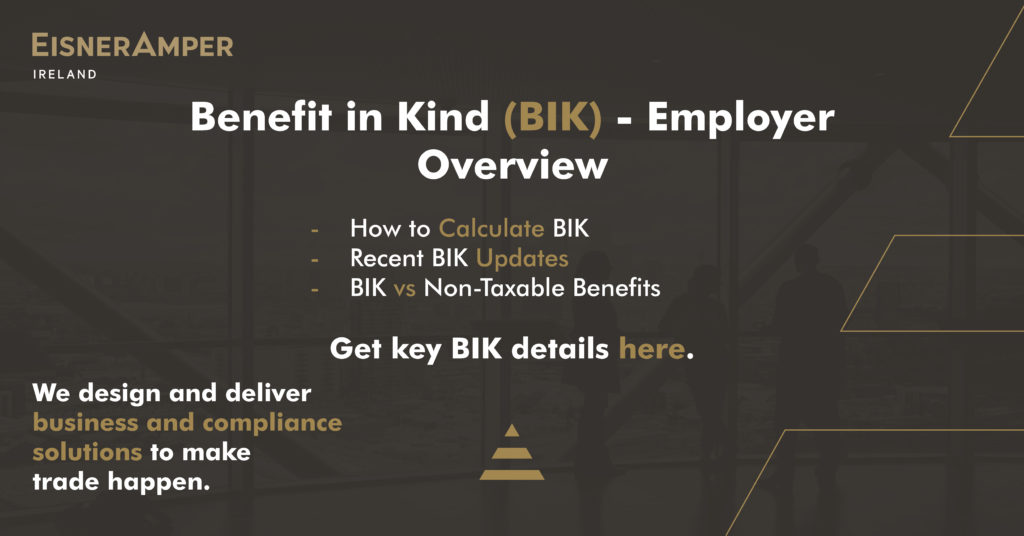
What Is BIK?
As a general rule, any benefit or perquisite, other than cash, which an employer provides for an employee would be considered a BIK once it has monetary value. It is the responsibility of the employer to calculate the value of the BIK and deduct the appropriate employment taxes via the PAYE system. Benefits given to an employee’s spouse or family members would also be considered BIK.
Taxation Of BIK
Tax must be deducted on the actual value of the benefits provided, unless the actual value is not known. In this case, tax must be deducted on the estimated value of the benefit.
The value of the benefit must be added to the employee’s pay as a notional pay element in the pay period in which the benefit was provided. PAYE, PRSI and USC are then deducted from the total value of the employee’s pay plus the BIK. This should then be reported to Revenue in a payroll submission either on or before the date the employee receives their net salary payment.
How Do You Calculate BIK?
Some BIKs have specific rules which must be followed in order to calculate the taxable value.
– Example 1: How To Calculate BIK On A Company Car
The taxable value (known as the cash equivalent) is based on a percentage of the Original Market Value (OMV) of the car, less any discount received when the car was purchased*. The percentage is dependent upon the number of business kilometres driven by the employee each year, as shown in the following table:
| Kilometres Driven | (% of OMV) |
| 24,000 and below | 30% |
| 24,001 to 32,000 | 24% |
| 32,001 to 40,000 | 18% |
| 40,001 to 48,000 | 12% |
| 48,001 and over | 6% |
(Source: revenue.ie)
Journeys to and from an employee’s normal place of work are not considered business travel.
Employees who work, on average, at least 20 hours per week, whose business kilometres are between 8,000 and 20,000 km per year and who spend at least 70% of their time away from their normal place of work can avail of a 20% reduction on their cash equivalent value.
– Example 2: How To Calculate BIK On Health Insurance
If you purchase health insurance on behalf of an employee this would be considered a taxable BIK. Although the amount paid by the employer to the insurer is the net cost of the policy, the value of the BIK for the employee is based on the gross cost. The employee gets tax relief by submitting a claim for a Medical Insurance Relief tax credit via their Revenue account at the end of the tax year.

Recent BIK Updates
Before PAYE modernisation, corrections to estimated BIK values could be made at any point in the tax year up to the filing of the annual P35 return. Since 1 January 2019, when the actual value of a benefit becomes known after BIK has been calculated on an estimated amount, the correction must be made in the next available pay period.
BIK vs Non-Taxable Benefits
Although in general all benefits are taxable, there are some exceptions to this rule. The following non-exhaustive list showcases some of the items which can be provided tax-free, provided certain conditions are met:
- Expenses – Expenses must be incurred wholly, exclusively, and necessarily in the performance of the employee’s duties and must be vouched with receipts.
- Long Service Awards – The award must be a ‘Tangible Article’, i.e. not cash. The cost to the employer must be less than €50 per year of service and the period of service must be over 20 years. The employee must not have received a similar award within the previous 5 years.
- Relocation Expenses – Only expenses which are a direct result of the change of residence can be repaid tax-free. More information on Relocation Expenses can be found here.
- Travel Passes – The travel pass must be issued by a public or private operator who holds a valid licence.
- Bicycles & Equipment – The cost cannot exceed €1,000 and goods must be purchased from a registered supplier.
- Phones & Computers – Mobile phones, landlines, internet connections and computer equipment can be provided when primarily for business use.
The information above is for guidance purposes only. Tax advice should always be sought before providing benefits and reimbursements to employees without deducting employment taxes.
How EisnerAmper Ireland Can Help
The taxation of employee benefits can be challenging, particularly for non-resident employers and new businesses, although with continuously evolving legislation all employers should review their practices regularly.
At EisnerAmper Ireland, our dedicated team of payroll professionals and tax advisors are on hand to offer accurate guidance and advice on the taxation of benefits, as well as providing support and payroll processing services to both new startups and established businesses.
Learn more about our Outsourced Payroll Services here.
Request a payroll quote or request a callback from our specialists now.
*Discounts of more than 10% must be approved by Revenue.
Request a Quote
Contact Us
The content above is provided for general information purposes only and is not intended to provide, nor does it constitute, professional advice on any particular matter.
Zero Hour Contracts – Employer Update
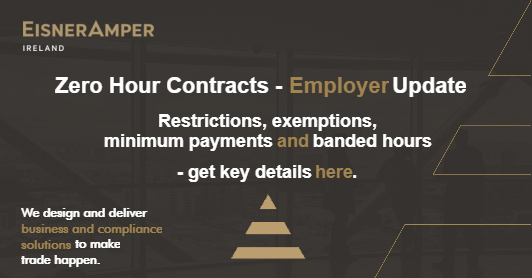
What Is A Zero Hour Contract?
A Zero Hour contract is an employment contract that does not guarantee an employee a minimum number of working hours, whilst still requiring the employee to be available for work either for a certain number of hours or when required by the employer (or both).
Zero Hour Contracts vs If And When Contracts
Under a Zero Hour contract there is an obligation on the employer to offer work to the employee and an obligation on the employee to accept the offer of work. If the employee is not offered hours during the time when they are expected to be available, the employer must compensate the employee.
Alternatively, if an employee and an employer agree a contract that does not oblige either party to provide work or be available for work, this is known as an If and When contract. As there is no mutuality of obligation, anyone working under an If and When contract could be considered a contractor rather than an employee.
Zero Hour Contract Legislation Update For Employers
Under legislation that came into effect on 4 March 2019, the use of Zero Hour contracts is now restricted in most circumstances. Employers must now inform their staff of the number of hours they would be reasonably expected to work in a normal working day and a normal working week.
– Exemptions
Zero Hour contracts can still be used in the following situations:
- Where there is a casual nature to the employment;
- During a period of emergency; and
- When short-term cover for absences is a necessity.
– Terms Of Employment
Employers are now obliged to provide workers with a written statement of the five core terms of their employment within five days of starting work. The terms are:
- The full names of the employer and employee;
- The employer’s address;
- The duration of the contract, including the end date for fixed-term contracts;
- The rate of pay and method of calculation; and
- The reasonably expected number of hours in a normal day and week.

– Zero Hour Contract Minimum Payments
Key elements of the updated legislation relate to minimum payments. For example, if an employee is not called into work, they are entitled to be paid for 25% of the hours they would have reasonably been expected to work, at a rate of 3 times the national minimum wage. Therefore, an employee whose contract requires them to be available for 20 hours per week should be paid for a minimum of five hours in the event of not being offered work in any given week.
– Banded Hours
Where an employee’s actual number of working hours over a 12 month period is in excess of the hours stated in their contract they can request to be given a Banded Hours contract. A Banded Hours contract guarantees an employee an average number of hours of work within one of the following bands:
| Bands of weekly working hours | From | To |
| Band A | 3 hours | 6 hours |
| Band B | 6 hours | 11 hours |
| Band C | 11 hours | 16 hours |
| Band D | 16 hours | 21 hours |
| Band E | 21 hours | 26 hours |
| Band F | 26 hours | 31 hours |
| Band G | 31 hours | 36 hours |
| Band H | 36 hours and over |
Source: irishstatutebook.ie.
How EisnerAmper Ireland Can Help
Payroll administrators in Ireland operate in a heavily regulated space with legislative changes continually coming down the line which add new administrative requirements to existing work practices.
At EisnerAmper Ireland, our dedicated outsourced payroll professionals possess the knowledge and experience required to ensure you are fully compliant with current and future legislation, without impacting on the day to day running of your business.
Learn more about our Outsourced Payroll Services here.
Request a payroll quote or request a callback from our specialists now.
Request a Quote
Contact Us
Latest News →How To Set Up Payroll In Ireland – 5 Key Steps
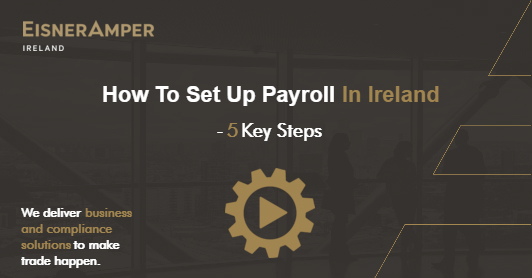
If you employ staff in Ireland you are obliged to deduct employment taxes which must be reported and paid to Revenue under the PAYE system. Under Revenue’s programme of PAYE modernisation that came into effect 1 January 2019, payroll taxes must now be reported to Revenue on, or before, the date employees get paid. Essentially, having an effective payroll function set up and ready to go from day one is now more of a necessity for new employers in Ireland who wish to ensure compliance with current legislation.
The following are 5 key steps which must be taken ensure that your first pay run goes off without a hitch:
Step 1: Company Incorporation
In step 2 we look at the tax registration process, however, before you can register your company as an employer with Irish Revenue it must first be incorporated and registered with the Irish Companies Registration Office (CRO) by filing a Form A1. A full list of the documents which must be submitted along with the A1 can be found on the CRO website.
Get company incorporation support here.
Some non-resident entities who wish to employ staff members to carry out duties in the state may not be required to register with the CRO, see “Step 2” for more information.
Step 2: Employment Tax Registration
For most companies, registration for Employment Taxes (PREM) with Irish Revenue is carried out by completing a form TR2 which is returned to the regional Revenue Registration Unit relevant to your location. Tax advisors can complete the registration process on your behalf using an online form which can significantly reduce the processing time.
Non-resident entities who have no physical presence in Ireland can also obtain a PREM registration by completing a form TR2 (FT). There are, however, other tax considerations for non-resident companies with employees in Ireland that should be considered, such as Permanent Establishment for Corporation Tax – for more information contact our Tax specialists.
Information about your obligations when you become registered as an employer can be found here.
Get payroll and employment tax support here.

Step 3: Become Familiar With Irish Employment Law
You can set up and run a payroll in Ireland without having any prior knowledge of Irish employment law, however, it is definitely beneficial to become familiar with your obligations as an employer along with the basic rights of your employees. Some of the more common elements of employment law that will affect most, if not all, of your employees are as follows:
- Minimum Wage
- Maximum average working hours
- Annual Leave
- Maternity / Paternity Leave
- Public Holidays
The Citizens Information website is a useful resource with further information – read “Employment rights and conditions” here.
Step 4: Choose In-House Or Outsourced Solution
For a new employer with previous experience of processing a payroll in Ireland, it may be helpful to review the latest legislation, purchase the relevant software and incur the associated administrative costs. Some companies, particularly larger operations, could opt to take on a payroll specialist in the first round of hires. For everyone else, a sensible and cost-effective option is to engage the services of outsourced payroll specialists to provide accurate calculations, meet statutory obligations and effectively manage one of the most critical functions of a fledgling business.
Get specialist outsourced payroll partners – request a quote here.
Step 5: Assess The Suitability Of Your Bank Account
Once calculated, your employment tax liability must be reported to Revenue on, or before, the date you make the payments to your staff. This liability is then due for payment to Revenue, in most instances by the 23rd day of the following month. It is still possible to manually make these payments via wire transfer, BACS, EFT etc., however, this process can be automated if your business has a *SEPA compliant bank account. The BIC and IBAN of your SEPA account is added to your Revenue On-line Service (ROS) profile to create a Debit Instruction which allows Revenue to deduct the funds on the appropriate date.
*Since 2010 every bank account opened in an EU member state is SEPA compliant.
How EisnerAmper Ireland Can Help
At EisnerAmper Ireland, our dedicated team of professionals possess the knowledge and experience required to provide guidance and the intelligent solutions you need when setting up business in Ireland. As your business grows, we will tailor our offering to ensure your needs are met at every stage of your development.
Learn more about our Outsourced Payroll Services here and our Company Secretarial Services here.
Request a payroll quote or request a callback from our specialists now.
Request a Payroll Quote
Contact Us
Latest News →Ireland & UK Employment Law Compared – 10 Key Considerations
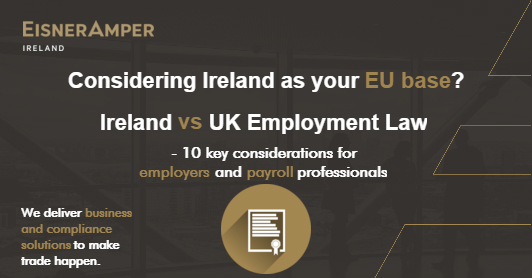
Employment law in Ireland is broadly similar to its UK equivalent, which is good news for employers operating in both jurisdictions, and is particularly attractive to UK businesses looking for a European base as part of their Brexit strategy. There are, however, numerous differences which prospective employers should consider before setting up their Irish operation.
1. Minimum Wage In Ireland vs The UK
The National Minimum Wage in Ireland, as of 1 January 2019, is €9.80 per hour for all employees aged 20 or over. For workers under the age of 20, their entitlement is based on a percentage of the National Minimum Wage – learn more about Irish National Minimum Wage rates here.
In the UK, from April 2019 the National Living Wage is £8.21 per hour for employees aged 25 and over. Under 25s must be paid either the Apprentice rate of £3.90 per hour, or the appropriate National Minimum Wage rate for their age bracket. Learn more about UK National Minimum Wage and National Living Wage rates here.
2. Irish And UK Public Holidays
Ireland has nine public holidays each year (often referred to as ‘Bank Holidays’), while England & Wales have eight. Scotland has nine, although the dates can vary from region to region, while in Northern Ireland there are 10 officially recognised public holidays per year.
3. Annual Leave Entitlements Compared
Under UK law, workers are entitled to 5.6 weeks of paid leave, which equals 28 days for someone who works a standard five-day week. Public holidays can be included in this calculation.
Under Irish legislation, employees have a basic annual leave entitlement of four weeks, which does not include public holidays.
In both countries, part-time workers are entitled to a pro-rata equivalent of the full-time rate.
4. Sick Pay Entitlements In Ireland vs UK
Under Irish employment law, there is no statutory entitlement to be paid by your employer while on sick leave. Instead, Illness Benefit can be claimed from the Department of Employment Affairs and Social Protection.
UK employers are obliged to pay their eligible staff Statutory Sick Pay (SSP) for a period of up to 28 weeks.
Annual leave is still accrued during periods of sick leave in both Ireland and the UK.
5. Differences Between Irish And UK Maternity And Paternity Leave
In Ireland, the maternity leave entitlement is 26 weeks of paid leave, with the option of claiming a further 16 weeks of unpaid leave. This is quite different to the UK, where maternity leave is 52 weeks with 39 weeks paid. Fathers in both countries are entitled to two weeks paid paternity leave.
As with SSP, maternity and paternity pay in the UK is paid by the employer, while Irish employees must claim the equivalent from the Department of Employment Affairs and Social Protection.
6. PAYE Systems
The UK introduced Real Time Information (RTI) for reporting payments and deductions made under the PAYE system in April 2014, with information being transmitted to Her Majesty’s Revenue and Customs (HMRC) each time an employee is paid.
Under the PAYE modernisation programme, the Irish Revenue Commissioners (“Revenue”) launched a similar system in January 2019. Irish workers can now view an up to the minute record of their year-to-date pay and tax information via an online Revenue account.
7. UK vs Ireland Employee Tax Considerations

Company cars are taxed differently in the two countries, with tax in the UK calculated on ‘the value to you of the company car’. Once calculated, the employer must report this to HMRC using an online form P11D.
In Ireland employees pay Benefit in Kind (BIK) through payroll on a percentage of the Original Market Value (OMV) of their company car, with the percentage dependent on the number of business miles travelled.
Medical Insurance purchased by an employer is taxable through payroll as a BIK in Ireland, while this is also reported via the P11D system in the UK.
The amount of tax relief available to an employee in the UK is adjusted to capture the tax due on the benefits reported in the P11D for the previous tax year.
8. Pension Considerations For UK And Irish Payroll
Employers in the UK have to provide a workplace pension scheme and automatically enrol their staff into it. Employees do have the right to opt out, although they must be re-enrolled every three years. Currently in Ireland there is no obligation on employers to provide an occupational pension scheme, although they are obliged to offer staff access to a type of pension known as a PRSA. There are plans to introduce auto enrolment in Ireland along similar lines to the UK, with a proposed launch date of 2022.
9. Gender Pay Gap Reporting
UK employers with over 250 employees are obliged to submit an annual report to the government showing the difference between the average hourly wage of all men and women in their organisation. This information is uploaded to the government via an online portal and must be published on the company’s website. The Irish government is planning to introduce similar legislation and has suggested that it will ultimately apply to all employers with over 50 staff. No implementation date has yet been set in Ireland for this. Learn more about gender pay gap reporting in Ireland here.
10. Useful Tax Relief Opportunities When Moving To Ireland
When setting up an Irish company it is sometimes necessary for an employer to redeploy experienced staff from other countries to Ireland, which can be costly. To assist with this there are tax reliefs available for the employer and employee.
Relocation tax relief allows employers to cover the costs associated with the removal and relocation of inbound employees without incurring a tax liability, while Special Assignee Relief Programme (SARP) is a relief aimed at reducing the amount of PAYE payable by higher earners.
How EisnerAmper Ireland Can Help
At EisnerAmper Ireland, our dedicated team of outsourced payroll professionals possess the knowledge and experience required to provide guidance and advice to employers setting up in Ireland for the first time. We also provide ongoing support and payroll processing services to organisations at every stage of their development.
Learn more about our outsourced payroll services here.
Request a payroll quote or request a callback from our specialists now.
Request a Quote
Contact Us
Latest News →Employee Relocation Tax Relief – Moving to Ireland
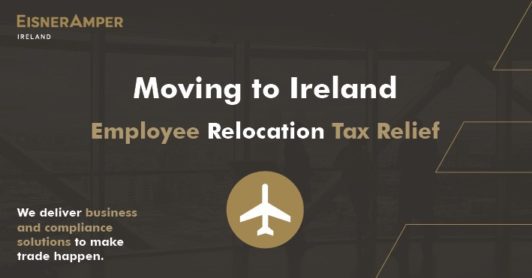
Removal and Relocation Expenses Overview for Employers
Workforce Global Mobility is an increasingly common consideration for businesses that operate in multiple jurisdictions and can result in significant increases to staffing costs, over and above the standard payroll and employment tax considerations. Hiring staff from overseas is also increasingly common, which can create challenges for the employer. Covering the costs associated with relocation is standard practice when transferring employees to Ireland. However, there are various tax implications that must be taken into account at the planning stage to minimise potential liabilities.
Revenue’s Tax and Duty Manual Part 05-02-03, Removal and Relocation Expenses, notes:
"The taxation of certain removal and relocation expenses should be relaxed in genuine cases of employees having to incur expenses to move to a new employment location, where the payment made by the employer towards the expenses results in no net overall benefit to the employee." Source: revenue.ie.
Tax-Free Employee Subsistence Expenses
As is the case with all expense reimbursements, Revenue require payments to be matched with receipted expenditure, with the exception of temporary subsistence allowances. Employers are permitted to pay a temporary subsistence allowance to employees while they are looking for accommodation in their new location. The amount allowable is based on 10 nights at the Civil Service Rates (up to €147 per night).
It is important to note that the amount reimbursed cannot be greater than the cost borne by the employee.
Employee Relocation Tax Relief Conditions
According to Revenue, the following are the conditions that must be satisfied to allow removal and relocation expenses to be paid tax-free:
- there are actual removal and relocation expenses; - the expenses are for a reasonable amount; - the payment of the expenses is properly controlled; and - moving house is necessary. Source: revenue.ie.
What Relocation Expenses Can Be Claimed Back?
There is no definitive list of the expenses which can be claimed back tax-free, so it is the responsibility of the employer to ensure that any payments meet the prescribed conditions, however, some of the more common items include:
- Costs associated with moving house, such as auctioneer’s fees, solicitor’s fees & stamp duty; and
- Costs associated with movement of furniture, including storage, transportation, insurance & cleaning.
Travelling expenses may also be included, along with up to three months of vouched rent in temporary accommodation (both rent and temporary subsistence cannot be paid).

What Relocation Expenses Cannot Be Claimed Back?
Payments towards the cost of purchasing or building a house cannot be paid tax-free, and similarly, amounts paid towards either loans or bridging loan interest would also be considered taxable pay.
Records Needed for Employee Relocation Tax Relief
As previously noted, all relocation payments (other than temporary subsistence) must be matched with receipted expenditure, so any relevant receipts, invoices, statements and proofs of purchase must be kept by the employer. All such records must be retained for a period of six years from the tax year-end to which the records refer.
Related payroll insights article: SARP For Employers.
How EisnerAmper Ireland Can Help
At EisnerAmper Ireland, our dedicated team of outsourced payroll professionals possess the knowledge and experience required to assist employers seeking the most beneficial solutions to their global mobility problems. From planning to execution, we can provide expert advice and insight every step of the way.
Learn more about our outsourced payroll services here.
Request a payroll quote or request a callback from our specialists now.
Request a Quote
Contact Us
Latest News →Gender Pay Gap Reporting
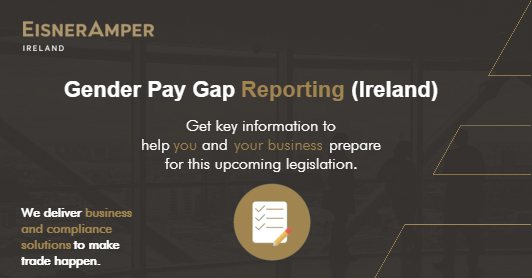
Under legislation that came into effect in April 2017, UK employers with more than 250 employees are required to publish and report specific figures about their gender pay gap. The Irish government has recently published a similar draft bill (view the proposed Irish gender pay gap bill here), which is expected to be enacted in the near future and will make gender pay gap reporting a requirement for certain Irish businesses. The bill is currently before Dáil Éireann (in the third stage) and the status, in addition to the history, of the proposed gender pay gap bill can be accessed via oireachtas.ie.
We outline below some key information and points of note that organisations should take into consideration in their preparation for this potential new business requirement.
“Gender Pay Gap” Definition
According to the European Institute for Gender Equality, gender pay gap “represents the difference between the average gross hourly earnings of female and male employees.” Source: eige.europa.eu.
What Is Ireland’s Gender Pay Gap & How Do We Compare With The EU?
Eurostat’s 2016 Gender Pay Gap Statistics Report notes that the gender pay gap in Ireland is 13.9%, which means that on average women get paid €86.10 for every €100 paid to their male counterparts. Although Ireland ranks 11th of 28 in the EU (europa.eu, 2016), and is below the average of 16.2%, it is still some way off the lowest EU gender pay gap which was recorded in Romania with an average of 5.2%.
Gender Pay Gap vs Equal Pay
The gender pay gap is the disparity between average earnings of men and women in an organisation while equal pay means that men and women performing the same role must receive the same rate of pay. If a majority of senior positions in an organisation are filled by men (or women), there will be a gender pay gap, even if the equal pay laws have not been broken.
What Is Gender Pay Gap Reporting?
Gender pay gap reporting is the obligation to publish detailed annual reports highlighting an organisation’s pay differences across a range of metrics.
What Is The Objective Of Mandatory Gender Pay Gap Reporting?
The objective of mandatory gender pay gap reporting is to highlight any discrepancies that may exist between the average pay of male and female employees across medium-large sized organisations. Ultimately, according to the Department of Justice and Equality, the goal is to remove the barriers which prevent the advancement of full socio-economic equality for women.
Who Does The Gender Pay Gap Legislation Affect?
Initially, the proposed legislation will affect companies that have 250+ employees, although the government plans to eventually extend the obligation to organisations with 50+ employees.
When Will The Legislation Come into Effect?
A date has not yet been set, which should provide employers the opportunity to take steps to address requirements before reporting becomes mandatory.

What Information Will Likely Be Required In Your Gender Pay Gap Report?
Under the draft legislation, gender pay gap reports will have to include a wide range of statistics. When looked at in conjunction with the UK’s gender pay reporting requirements, it is likely that employers will have to report on the gender differences in:
- Gross hourly pay;
- Bonus payments;
- Part-time / temporary contracts;
- Benefits in kind; and
- Employees across four quartiles.
What To Do With Your Completed Gender Pay Gap Report
Similar to the UK, it is likely that completed gender pay reports will be required to be published on the company’s website and uploaded via an online portal, the exact details of which are yet to be revealed.
Non-Compliance With Gender Pay Gap Reporting Requirements
It is expected that fines will be levied against firms that fail to comply with their reporting obligations. Reputational damage may also potentially serve as a deterrent to non-compliance.
Ensure Gender Pay Gap Compliance
At EisnerAmper Ireland, our dedicated team of outsourced payroll professionals possess the tools and the expertise to analyse your payroll data and produce detailed reports highlighting the current gender pay gap in your organisation. From this, we can highlight key areas to address, which will allow your HR function to develop a strategy to address any imbalances and make year on year improvements in your gender pay gap report.
Learn more about our outsourced payroll services here.
Request a payroll quote or request a callback from our specialists now.
Request a Quote
Contact Us
Latest News →Auto Enrolment – What Employers and Employees Can Expect
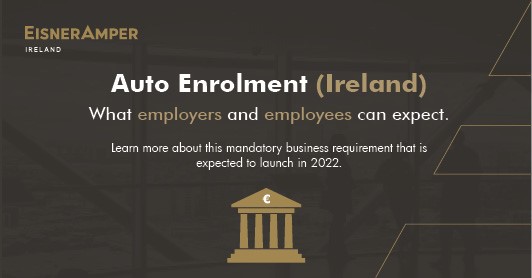
What Is Auto Enrolment?
Auto Enrolment is a retirement savings scheme which, if implemented, will be mandatory for all employees between the ages of 23 and 60, earning over €20,000 per annum who do not already contribute to a workplace pension. Launching in 2022 on a phased basis, it is expected that the government will incentivise the scheme by contributing €1 for every €3 saved by the employee.
Why Is “A New Automatic Enrolment Savings System” Being Explored?
According to the government only 35% of Irish private sector employees have a supplementary pension, which means that a significant percentage of the population will not have the adequate savings necessary to sustain their pre-retirement standard of living into old age. The concern is that the pension system in its current form is not sustainable and requires significant reform in order to meet the long-term demands of the working population. Auto Enrolment is one of the measures outlined in the Government’s “Roadmap for Pensions Reform” which sets out the actions required to overhaul the approach to providing for pension income in retirement.
Auto Enrolment – What Employers Can Expect
To minimise the potential increased administrative burden on employers when implementing Auto Enrolment, the Government has announced there will be supports available during the roll-out phase. Employers will be responsible for enrolling their employees into the scheme, and for remitting the pension contributions to a state-run ‘Central Processing Authority’ (CPA), although there are currently no plans to involve employers in the selection of their employees’ Registered Provider or savings fund option. Employers will have to match their employees’ contributions (up to 6% of pensionable pay, with a ceiling of €75,000) and their contributions will be deductible for corporation tax. According to the “Strawman Proposal”, penalties will be levied on employers who fail to implement the scheme, which could lead to prosecution for repeat offenders.

Auto Enrolment – What Employees Can Expect
Under the current proposal, employees can choose a preferred savings option from a range of Registered Providers, however, those who do not exercise this choice will be provided with a fund and provider by default. Although employees will be enrolled automatically, they will be permitted to opt-out at the end of a minimum period, which is currently proposed to be “during the 7th and 8th month of membership” (read the Strawman Proposal for more details). Importantly for employees, there will be a facility to transfer their account between employments.
Expected New Employer Tasks If/When Auto Enrolment Is Introduced
Based on the latest information, employers will be required to:
- Identify the employees eligible for enrolment;
- Arrange the deduction of employee contributions;
- Match the employee contributions; and
- Remit the payments to the CPA.
How EisnerAmper Ireland Can Help
At EisnerAmper Ireland, our dedicated outsourced payroll team combines in-depth knowledge of the Irish payroll landscape with market leading software to create solutions to meet our clients’ unique requirements. We leverage this expertise to support employers through all phases of Auto Enrolment, from initial implementation to the deduction and reporting of employee contributions.
Learn more about our outsourced payroll services here.
Request a payroll quote or request a callback from our specialists now.
Request a Quote
Contact Us
Latest News →PAYE Modernisation
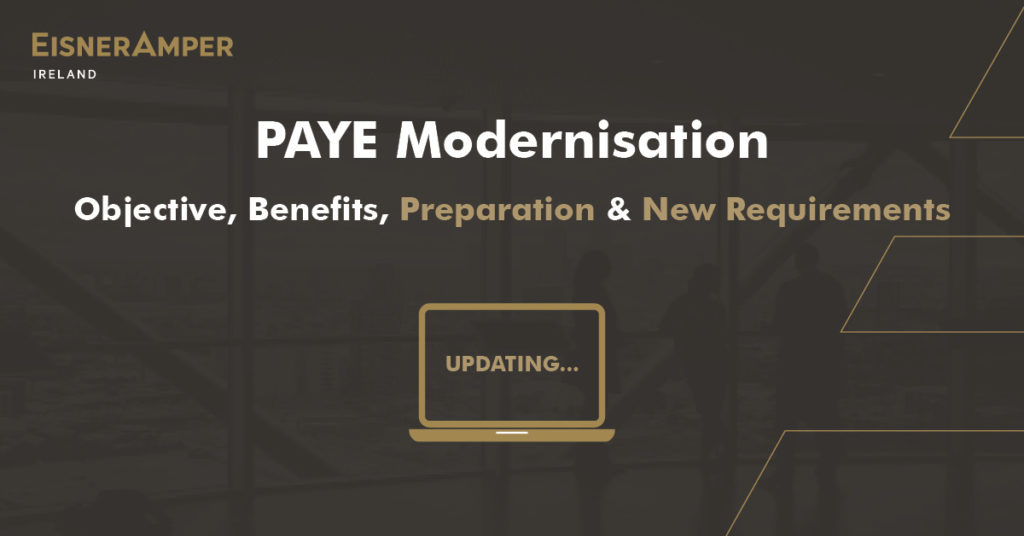
What is PAYE modernisation?
PAYE modernisation is a fundamental change to the current system of reporting PAYE deductions to Revenue and represents the most significant update to the PAYE system since its inception in 1960. The new regime is designed to meet the demands of today’s workforce by utilising modern communication technologies to enable “real time” reporting of employee’s payroll data. Traditional payroll returns, such as the P30, P46 and P35 will become obsolete, as will paper forms of P45 and P60.
The objective of PAYE modernisation
“The objective of PAYE Modernisation is that Revenue, employers and employees will have the most accurate, up to date information relating to pay and tax deductions. This will ensure that the right tax deduction is made at the right time from the right employees, and that employers pay over the correct tax deduction and contribution for every employee. This will improve the accuracy, ease of understanding, and transparency of the PAYE system for all stakeholders.”
(Source: Revenue.ie – PAYE Modernisation – Report on Public Consultation Process.)
The benefits of PAYE modernisation
For employers, reporting pay, tax and other deductions in real time (i.e. when the payroll is being processed) will alleviate the administrative burden associated with the processing of a payroll year-end. Changes to employee’s tax credits and rate bands will be automated which will eliminate the possibility of deducting an incorrect amount of tax.
Employees will benefit from the ability to view accurate, up-to-date information relating to their PAYE deductions anytime via their online Revenue myAccount. Real-time data will assist Revenue in ensuring that employees get the full benefit of their entitlements during the year, particularly where an individual has a number of employments.

How employers & payroll personnel can prepare for PAYE modernisation
Employers, and those responsible for the provision of payroll services, should review their current practices in readiness for the upcoming changes. As with all largescale changes, stakeholder engagement is key to ensuring that all those affected are aware of their evolving obligations. Payroll processes will need to be streamlined and a greater focus placed on quality, as the submission of payroll data must be made on, or before, the employee’s pay date.
New requirements arising from PAYE modernisation
The main requirements to ensure a frictionless transition include:
- Payroll software must be compliant with the new system;
- Employees will need to register for a Revenue myAccount to manage their tax affairs; and
- An accurate list of employees must be uploaded to Revenue via ROS.
How EisnerAmper Ireland can help
At EisnerAmper Ireland, our dedicated team of outsourced payroll professionals possess the tools and the expertise to process your payroll accurately and efficiently. We utilise market leading software to ensure compliance and our staff are highly trained and fully prepared to meet the challenges that PAYE modernisation may bring.
Learn more about our outsourced payroll services here.
Request a Quote
Request a payroll quote or request a callback from our specialists now.
Latest News →

